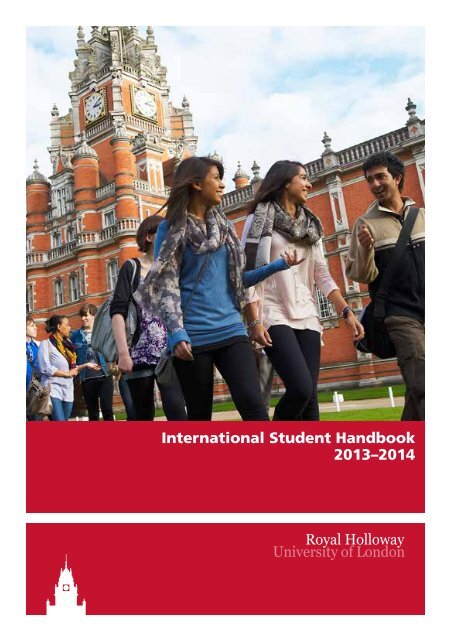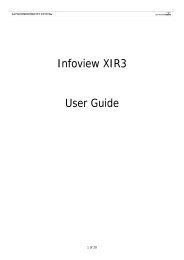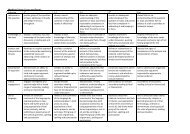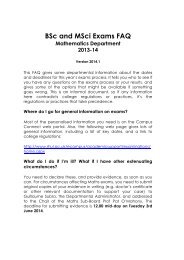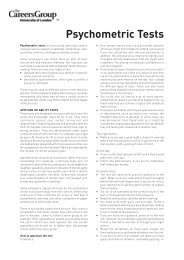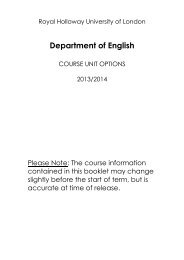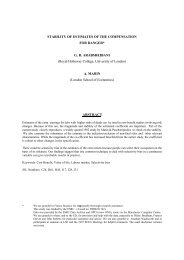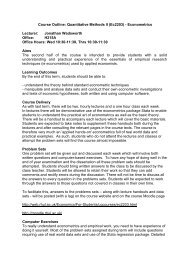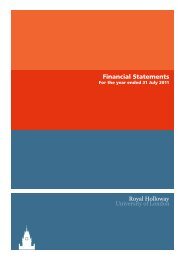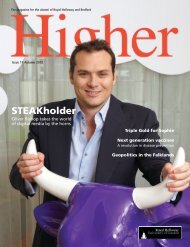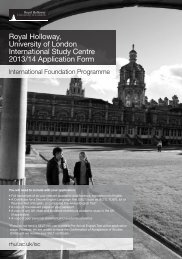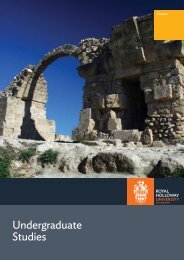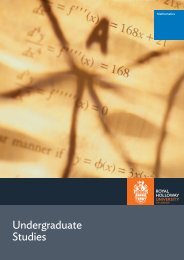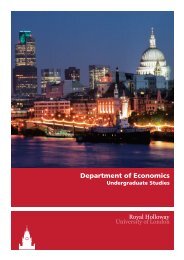International Student Handbook - Royal Holloway, University of ...
International Student Handbook - Royal Holloway, University of ...
International Student Handbook - Royal Holloway, University of ...
- No tags were found...
Create successful ePaper yourself
Turn your PDF publications into a flip-book with our unique Google optimized e-Paper software.
<strong>International</strong> <strong>Student</strong> <strong>Handbook</strong>2013–2014
Term dates 2013–14Monday 23 September – Friday 13 December (12 wks)(4-week Christmas break)Monday 3 January – Friday 28 March (11 wks)(4-week Easter break)Monday 28 April – Friday 13 June (7 wks)Graduation Ceremonies: 14–18 July 2014<strong>International</strong> <strong>Student</strong> Support TeamDenise KeableDeputy Head <strong>of</strong> Support and Advisory ServicesFW139 Founder’s Buildingd.keable@rhul.ac.uk01784 443663Sue Silk<strong>International</strong> <strong>Student</strong> AdvisorFW139 Founder’s Buildingsue.silk@rhul.ac.uk01784 276168Liesl Shears<strong>International</strong> Funding CoordinatorFW139 Founder’s Buildingliesl.shears@rhul.ac.uk01784 443003Vicky Li<strong>International</strong> Support Admin AssistantFW139 Founder’s Buildingvicky.li@rhul.ac.uk01784 276222Please contact:internationaladvice@rhul.ac.uk
ContentsDear student,Welcome to <strong>Royal</strong> <strong>Holloway</strong>, <strong>University</strong> <strong>of</strong> London. We are very pleased that you have chosen tostudy with us. Studying overseas <strong>of</strong>fers many exciting experiences but it can also be challenging toadjust to a new environment. Things may be confusing at first. I hope that the information in thishandbook will help to make your time here as easy and enjoyable as possible.If you have any worries or concerns, please feel free to visit the <strong>International</strong> <strong>Student</strong> SupportOffice, located on the west side <strong>of</strong> Founder’s, room 139.Regards,Denise KeableDeputy Head <strong>of</strong> Support and Advisory ServicesArrival 4–11EnrolmentFee paymentHalls <strong>of</strong> residenceOrientation programmesTier 4 <strong>Student</strong> ResponsibilitiesThe College Health Centreand the National Health ServicePolice registrationClothing and climateElectrical equipmentPhotographsInsuranceLiving in the UK and 12–26student lifeTeaching and study methodsAcademic services<strong>Student</strong> servicesBankingEmployment and volunteer workTelevision licenceCars, parking and drivingPostal servicesLaundry facilitiesTelephonesSmoking and alcoholLocal travelTours in the UK and EuropeVisa informationInformation for students 25–27with dependantsAccommodation for familiesChildcare and schoolsHealth care for dependantsEmployment for spousesContact information and 28–29useful websites3
ArrivalOnce your enrolment is complete you willreceive a College Card, which is your<strong>Royal</strong> <strong>Holloway</strong> student ID card, giving youaccess to the College facilities.Fee paymentBefore you are able to register as a student,you must provide <strong>of</strong>ficial confirmation that you,or your sponsor, has sufficient finances to meettuition and living expenses for the duration <strong>of</strong>your studies here.Payments should be made out to RHBNC(<strong>Royal</strong> <strong>Holloway</strong> and Bedford New College) inpound sterling. You can pay your fees in thefollowing ways:EnrolmentAll students must enrol with the Collegebefore they begin their studies. Enrolmentis simple and easy. You will be sent fullenrolment information before you arrive.This information is also available at:www.rhul.ac.uk/registry/enrolment/To enrol you need to have:1. Completed the online sign-up at:www.rhul.ac.uk/registry/enrolment/2. Sufficient finances to meet both tuition andaccommodation expenses for the duration <strong>of</strong>your studies here (see fee payment below).3. Your passport showing permission for you tobe in the UK as a student or your UK ID card(as an identity check for new students).• A cheque or banker’s draft payable in the UK• Credit card (MasterCard, Visa and JCB)• Debit card (Delta, Solo, Switch)• Bank-to-bank transfer• Travellers cheques (in pound sterling)• epay – www.rhul.ac.uk/epay/• Cash – but not recommended<strong>Royal</strong> <strong>Holloway</strong> does not accept Eurochequesor cheques drawn on an overseas bank. Wemay also refuse payments in a foreign currencyand, if accepted, the College is likely to deductbank charges. As the UK is outside the Eurocurrency zone, the Euro is only recognised asa foreign currency, and is subject to a movingexchange rate.4
<strong>Royal</strong> <strong>Holloway</strong> has a vibrantcommunity <strong>of</strong> students from over 130countries. Around 20 percent <strong>of</strong> ourstudents come from outside the UKIt is possible to pay all or part <strong>of</strong> your fees incash, but we would strongly urge you not tocarry around large sums <strong>of</strong> money. You shouldonly pay cash or traveller’s cheques in person,never by post. Make sure you get, and keep, areceipt as pro<strong>of</strong> <strong>of</strong> payment.Please note that you must have organised themeans to pay your tuition fees before you startat <strong>Royal</strong> <strong>Holloway</strong>. You will not be allowed toenrol if you cannot pay the amount for whichyou are liable. If you have a sponsor, pleasebring with you pro<strong>of</strong> <strong>of</strong> payment by a thirdparty.The regulations concerning payment andremission <strong>of</strong> tuition fees apply to studentstaking standard undergraduate or postgraduatedegree programmes, and most diplomas andcertificates. <strong>Student</strong>s with <strong>Royal</strong> <strong>Holloway</strong><strong>International</strong> as their home department shouldrefer to the payment requirements specifiedby <strong>Royal</strong> <strong>Holloway</strong> <strong>International</strong> for theirprogramme.Exceptionally, arrangements may be madewith the <strong>Student</strong> Fees Office to pay tuitionfees in up to two instalments. Exceptionally,arrangements may be made with the <strong>Student</strong>Fees Office to pay tuition fees in up to twoinstalments for new <strong>International</strong> <strong>Student</strong>sand two or three instalments for continuingstudents. To do this, you must have writtenagreement from the <strong>Student</strong> Fees Office. Thereis an administration charge for an installmentfacility in the region <strong>of</strong> £100–£200 dependingon the number <strong>of</strong> installments and the value<strong>of</strong> fees.If you find yourself in financial difficulties,please inform the <strong>Student</strong> Fees Officeimmediately. They can help you to negotiate away round the problem.Tuition fees are set annually and adjustedaccording to inflation and market conditions.For more information, please visit the studentenquiry desk in the Windsor Building.Halls <strong>of</strong> residenceFeesAccommodation fees are charged on a termlybasis and must be paid at the beginning <strong>of</strong>each term. There is no facility for students topay on a monthly basis. The fees are basedon the number <strong>of</strong> weeks <strong>of</strong> each term. Youshould also be aware that some studentaccommodation is on a term-time onlybasis, which means that students must fullyvacate their rooms during the Christmas andEaster breaks. <strong>Student</strong>s living in this type <strong>of</strong>accommodation who want to remain overthe holidays or leave personal belongings atthe College will need to budget for the rental<strong>of</strong> storage space or for renting a roomthrough the ‘vacation residence’ provision(£15.30 approx.).5
ArrivalcontinuedLocal accommodationIf you will be renting accommodation in thelocal community, you will probably be askedfor a deposit <strong>of</strong> two months or more rent(Please note you may be asked for a guarantor).This will be approximately £500–£700 if youare renting a house, and less if you take uplodgings (houses are rented by groups <strong>of</strong>between three and six students and lodgingsare rooms which local residents rent out withintheir family home). <strong>Student</strong>s living in a housewill also be responsible for the utility bills forthe property; you will need to budget forelectricity, gas and water bills. Utility bills areusually included within the rent for lodgers.Council tax is only payable by non students.If you are living with non students theinternational student support <strong>of</strong>fice will behappy to advise you.a kitchen where they can prepare their ownfood. Basic food items can be purchased atthe College shop on campus. There is also asmall grocery store a few minutes walk away inEnglefield Green. Several larger grocery storesare located in Egham, which is a 15 to 20 minutewalk from the campus.In self-catering accommodation, you canexpect to spend about £6 per day on food ifyou buy only basic ingredients and cook foryourself. However it is important to rememberthat if you buy frozen or ready-meals, preparedsandwiches or other convenience food, yourcosts could run as high as £10 per day.In catered ‘pay-as-you-go’ accommodation,students must purchase their meals from one <strong>of</strong>the College dining halls. On average, studentsin pay-as-you-go accommodation spend aboutIf you will be renting <strong>of</strong>f-campus accommodation,you will also need to budget for expenses whileyou are looking for a place to stay. If you arrivemore than three days before the start <strong>of</strong> term,you may be able to stay in vacation residence,which costs around £15.30 per day on a roomonly basis. If you arrive less than three daysbefore the start <strong>of</strong> term, you will have to stay ina local hotel or Bed and Breakfast.Food<strong>Student</strong>s living in College halls <strong>of</strong> residence willeither be in self-catering or catered ‘pay-as-yougo’accommodation. <strong>Student</strong>s in self-cateringaccommodation will have unlimited access to6
£6 per day on food. They also have access to apantry, with an electric kettle for boiling waterand a small microwave to warm snacks or makehot drinks. <strong>Student</strong>s are not permitted to haveany cooking appliances such as microwaves,toasters, steamers or pressure cookers intheir rooms. <strong>Student</strong>s in ‘pay-as-you-go’accommodation who are found to be cooking,will be formally disciplined and may be asked toleave College accommodation.Please be aware that rooms in halls <strong>of</strong> residenceare allocated on an annual basis only andapplications to continue residence for afurther year should be made to the studentaccommodation in February.In the case <strong>of</strong> Founder’s and Reid, theaccommodation fee applies for term time onlyand rooms must be vacated during holidayperiods. The College does make a provision forvacation residence. Details <strong>of</strong> this provision areavailable from the hall reception desks.<strong>Student</strong>s who give notice to leave their roomsbefore the end <strong>of</strong> the agreed residence periodwill be liable for the rent for the whole sessionunless the room can be re-let by the studentaccommodation to another eligible student.There is an administrative charge when a roomchange occurs.<strong>Student</strong>s must only occupy the room they haveunder contract themselves. They may not let itto another student (this is called sub-letting),nor may they allow another person to sharetheir room, or occupy a room for which theydo not have a proper contract. <strong>Student</strong>s maynot give money to or receive money from otherstudents for the unauthorised use <strong>of</strong> a room.<strong>Student</strong>s who do this risk losing the moneythey have paid un<strong>of</strong>ficially, being asked to leavethe room and, in severe cases, being disciplinedby the College.RCS cardThe RCS account is a facility available on yourstudent card and works as a debit card. If yousubmit your application for an RCS accountby the deadline, you should be able to usethe facility as soon as you collect your CollegeCard at enrolment. You can put additionalmoney into your RCS account at the FMSupport Office (Founder’s West 43) and allhall receptions. When you make a transactionon your RCS card, the point <strong>of</strong> sale machinewill tell you how much money you have left.If you lose your card, you should inform staffin the RCS card <strong>of</strong>fice immediately and obtaina replacement.Orientation programmesDuring the first week <strong>of</strong> the session inSeptember there are a number <strong>of</strong> specialactivities planned to help new students tobecome familiar with the College. <strong>Student</strong>s livingin halls will have special activities planned toallow the residents to meet each other and thehall staff. Each academic department will holdenrolment and meetings during the first week,to enable students to meet each other and thelecturers, as well as to discuss departmental7
Arrivalcontinuedpolicies and academic issues. There are alsospecial orientation programmes specifically forinternational students. These are designed toinform students about the services and supportavailable at the College, and to discuss issues<strong>of</strong> particular interest to international students.Information on these programmes is available at:www.rhul.ac.uk/international/afterapplying/yourfirstweeksoncampus/home.aspxTier 4 <strong>Student</strong> ResponsibilitiesAs the sponsor for your Tier 4 <strong>Student</strong> visa,<strong>Royal</strong> <strong>Holloway</strong> has a duty to maintainyour student record and keep copies <strong>of</strong>your passport and visa. These will be takenat enrolment, but please inform <strong>Student</strong>Records if you renew either your passport orvisa or change your contact details. <strong>Royal</strong><strong>Holloway</strong> must also inform the UK BorderAgency if you fail to enrol, withdraw orinterrupt your studies or if you have anyunauthorised absences.The College Health Centre and theNational Health ServiceWe hope that your stay with us will be freefrom any health problems, but from timeto time students do experience illness. Forthis reason we have our own Health Centreon campus. Situated on the first floor <strong>of</strong>Founder’s East, it provides full National HealthService (NHS) General Practitioner servicesfor registered students and is part <strong>of</strong> theClarence Medical Centre, Windsor. A widerange <strong>of</strong> medical services is available, includingpsychiatric and physiotherapy services at thediscretion <strong>of</strong> your doctor.Studying overseas has huge benefits,but moving to another country can bestressful. If you have a pre-existing medicalor psychological condition, you may beparticularly vulnerable to problems. You musttherefore plan ahead to ensure that you canreceive appropriate medical or psychologicalsupport when you arrive in the UK.<strong>Student</strong>s living in halls <strong>of</strong> residence, or in thevicinity <strong>of</strong> the campus, may register with theCollege Health Centre. Registration takesplace during the first week <strong>of</strong> the session inSeptember. <strong>Student</strong>s arriving at other timesduring the year should register with the HealthCentre as soon as possible.If you are not registered with the CollegeHealth Centre, you may still make use <strong>of</strong> theCentre in the case <strong>of</strong> sudden illness or accidentwhilst you are at <strong>Royal</strong> <strong>Holloway</strong>. If you areliving in the local community, a list <strong>of</strong> doctorsoutside the immediate College area may beobtained from the Health Centre receptionist.If you have a medical or psychologicalcondition for which you are currently receivingtreatment, you are strongly advised to discussyour plans for studying in the UK with yourdoctor, counsellor or psychologist. TheEducational Support Office (ESO) at8
<strong>Royal</strong> <strong>Holloway</strong> can advise students aboutthe type <strong>of</strong> support facilities availableat the College and in the local area. It isrecommended that you contact the ESO(educational-support@rhul.ac.uk) beforearriving so that support can be discussed andany necessary arrangements made beforeyour arrival.If you have a long term medical or psychologicalcondition, it is a good idea to bring a letter fromyour doctor with you to the College HealthCentre. It should be in English, and outline yourmedical history with a full list <strong>of</strong> the medicationthat you are taking. You should also bring afour-week supply <strong>of</strong> your medication with you,to make sure that you have enough whilst youtransfer to the UK health system.The College Health Centre advises studentsto have a Meningitis C vaccination before theycome to the UK, if it is available in their homecountry. If you are not able to have this beforeyou travel, the vaccination is available fromthe College Health Centre for those under theage <strong>of</strong> 25.The National Health Service Regulation(HC83/10) states that an international studentenrolled on a course <strong>of</strong> study <strong>of</strong> six monthsor longer is eligible to use the National HealthService (NHS). The spouse and dependantsunder 16 (or under 19 if studying in school orfurther education) <strong>of</strong> such students are alsoeligible. If you are eligible for NHS treatment,cover starts from the date that you arrive inthe UK, but does not continue while you areout <strong>of</strong> the country. Therefore, you will not becovered while you are travelling to or fromthe UK or while you are in any other country.You are therefore are strongly urged to makeappropriate arrangements for travel/healthinsurance for any periods <strong>of</strong> time when theNHS will not cover you.Under the NHS, you will be asked to paytowards the cost <strong>of</strong> any prescriptions. Theseand other medicines can be bought fromthe pharmacy counter at a chemist. You are,however, entitled to free prescriptions if youare under 19 and studying full-time, if youare pregnant or if you have had a baby withinthe last 12 months. If you are an EU national,you may also be able to get free prescriptionson the grounds <strong>of</strong> low income, in which caseyou should complete a form HC2, which maybe obtained from the <strong>Student</strong>s’ Union Advice& Support Centre. You should complete theform and send it to the Department <strong>of</strong> SocialSecurity (DSS) for assessment. If you areeligible, you will be issued with an exemptioncertificate lasting six months.You should try and get your teeth checked bya dentist at least once a year. You need to beregistered with a doctor in order to qualify forNHS dental treatment. Your doctor can providelists <strong>of</strong> NHS dentists. Check first whether thedentist accepts NHS patients, as some onlyaccept private patients. Once accepted, you9
Arrivalcontinuedwill need to give the dentist the NHS numberon your medical card. As an NHS patient, youwill have to pay the minimum charge, butyou may get help with the cost on the basis<strong>of</strong> low income. To apply, you need to obtainand complete form HC2 (see above, EUstudents only).If you think you may need glasses, or needto visit an optician for an eye test, there is aminimum charge for getting your eyes tested.If the test shows that you need glasses orcontact lenses, the optician will give you aprescription. The costs <strong>of</strong> frames and lenses canvary considerably, so check costs with severalopticians before buying. You can apply for helpwith the costs <strong>of</strong> your glasses on the basis <strong>of</strong>low income, in the same way as for medicaland dental treatment, if you are from the EU.If you have already paid for your glasses, youcannot apply for a refund afterwards.If you are referred to a hospital for tests ortreatment, you may be subject to simplequestions about the length <strong>of</strong> your residence,to make an initial assessment <strong>of</strong> your NHScoverage.Police registrationIf the visa stamp in your passport or ID cardrequires you to register with the police,<strong>of</strong>ficers from Guildford Police Station will be inFounders East 139 on Monday23 September, Monday 14 October, andMonday 21 October, between 10am–3pm.If you arrive at the start <strong>of</strong> session, you maywait until these dates. You should present thefollowing documents at the time <strong>of</strong> registrationwith the police:• A valid passport and ID card• Two passport-sized photographs <strong>of</strong> yourself• A letter <strong>of</strong> acceptance from the College oryour College Card• A fee <strong>of</strong> approximately £34You will need to make an appointmentat Founder’s West 139 or email:internationaladvice@rhul.ac.uk<strong>International</strong> students who are arriving midsessionand need to register with the policeshould register at Surrey Police Headquarters.Please visit the <strong>International</strong> <strong>Student</strong> SupportOffice for more information.Clothing and climateThe UK has a relatively mild climate comparedto much <strong>of</strong> northern Europe, without extremes<strong>of</strong> hot or cold. However, if you come froma warm or hot climate, the UK will probablyfeel quite cold and wet. Generally the coldest(winter) months will be between Novemberand March. The warmest (summer) weatherwill occur between May and September.However, you can sometimes enjoy a beautifulwarm day in March or get a cold and rainy dayin July! An umbrella and waterpro<strong>of</strong> coat areessential as rain showers occur throughout theyear. While we rarely get prolonged periods <strong>of</strong>10
ain, showers can occur several times in oneday. It only snows occasionally in our part <strong>of</strong>the country, but during the winter months thetemperature will <strong>of</strong>ten dip below zero degreesCelsius, particularly at night.electrical equipment you wish to bring to theUK is compatible. Conversion plugs are widelyavailable from electrical shops or at airports.You should also be aware that many <strong>of</strong> the olderhalls <strong>of</strong> residence have only one or two electricalplugs and have restrictions on the amount <strong>of</strong>power which can be used. You will be advisedabout any limitations or restrictions on electricalequipment. Please be advised that you cannotuse personal cooking equipment in the pantriesin many halls or in your personal rooms.PhotographsWhen you enrol at <strong>Royal</strong> <strong>Holloway</strong>, you willbe asked to produce several passport sizephotographs <strong>of</strong> yourself.Electrical equipmentThe British electrical supply is rated at 240volts/50 cycles. It is important to reviewmanufacturers‘ instructions to ensure that anyInsuranceUnfortunately students may sometimesexperience problems, such as losing propertyor having it stolen, or becoming ill. That’s whyyou need to seriously consider purchasingappropriate insurance for your time at <strong>Royal</strong><strong>Holloway</strong>. You need to have the appropriatemedical coverage for your entire stay at theCollege and any travelling that you intendto do. You should also have insurance coverfor your personal belongings, especially forexpensive items such as computers. Please beaware that <strong>Royal</strong> <strong>Holloway</strong> does not insure oraccept any liability for the property <strong>of</strong> studentsliving in halls <strong>of</strong> residence. The <strong>Student</strong>s’ Unionhas information about UK insurance providersthat specialise in policies for students.11
Living in the UK and student lifemember <strong>of</strong> academic staff who is an experton the subject area being taught. Lecturesare usually formal occasions where studentslisten to the views <strong>of</strong> the lecturer and takenotes. However, lack <strong>of</strong> active participationdoes not make for an undemanding learningsituation. Following the argument <strong>of</strong> an expertwill require close attention as well as a goodunderstanding <strong>of</strong> the English language.Teaching and study methods<strong>Student</strong>s from outside the United Kingdom mayhave experienced teaching methods differentfrom those commonly used in British universities.Some international students may find that theyare expected to participate in discussions anddebates and to study more independently thanthey did in their home country.Teaching at <strong>Royal</strong> <strong>Holloway</strong> takes place mainly inthe first and second terms and takes the form <strong>of</strong>lectures, seminars, tutorials and practical work.Field studies are also included when studyingBiology, Geography and Earth Sciences.LecturesAt <strong>Royal</strong> <strong>Holloway</strong> there will usually bebetween 20 and 100 students in a lecture.The lecturer is normally a permanent, full-timeSeminarsSeminars take the form <strong>of</strong> group discussions.They are usually led by an academic member<strong>of</strong> staff and attended by between eight and20 students. <strong>Student</strong>s participate by askingquestions and putting forward their views.You might also be asked to make presentations.TutorialsMost departments <strong>of</strong>fer tutorials, which aremeetings with a small number <strong>of</strong> students. Theyprovide an opportunity to discuss academicwork in detail with a member <strong>of</strong> staff.Private studyLearning does not finish when the student leavesthe classroom. <strong>Student</strong>s will be expected to domany hours <strong>of</strong> private study, such as reading,researching and writing essays or projects.AssessmentAssessment varies with programmes <strong>of</strong> study.In some cases assessment is by coursework.In other cases it is by examinations, orsometimes it can be a combination <strong>of</strong> both.<strong>Student</strong>s will normally be informed about the12
<strong>Royal</strong> <strong>Holloway</strong> is located in a beautifulpart <strong>of</strong> Surrey, just 40 minutes by trainfrom the heart <strong>of</strong> the capitalassessment methods <strong>of</strong> their course during thedepartmental orientation sessions.Examinations take place in the third (summer)term. <strong>Student</strong>s are only permitted to sitexaminations if they have fulfilled all coursework and attendance requirements. Thereforeit is important for you to understand whatyou must attend and what coursework youmust complete. If you have any questionsor concerns about the requirements <strong>of</strong> yourcourse, you should speak to your PersonalAdvisor in your department. <strong>Student</strong>sare not permitted to progress if they donot successfully complete all end <strong>of</strong> yearassessments.Course expensesIn addition to your tuition fees, you can expectsome other academic expenses while you arestudying. <strong>Student</strong>s in every department shouldbudget for items such as books, notebooks,paper, pens and photocopying. Additionalexpenses will depend upon your course anddepartment. For example, some studentswill be required to purchase lab coats andprotective eyewear for laboratory work, andsome students may have to pay expenses forfield trips or for study abroad. Other studentsmay be required to attend films or stageproductions. Your department should be ableto advise you about the expenses you are likelyto have on your course.Postgraduate students should allow foradditional expenses such as travel associatedwith conferences and thesis presentation<strong>of</strong> their research. It may cost up to £380 toprepare a thesis (typing/photocopying/binding)for examination.Departmental and College notice boards<strong>Student</strong>s are responsible for keepingthemselves informed <strong>of</strong> events, activities,changes to lecture schedules, etc. that areposted on departmental or College noticeboards. You are strongly advised to regularlycheck your <strong>Royal</strong> <strong>Holloway</strong> email account andthe information displayed on notice boards;the details they provide may be helpful andimportant.Academic expectationsAn information session for internationalstudents on Academic Expectations in theUK will be held on Thursday 26 September at1.30–2.30pm in the Windsor BuildingAuditorium.13
Living in the UK and student lifecontinuedAcademic services<strong>Royal</strong> <strong>Holloway</strong> <strong>International</strong><strong>Royal</strong> <strong>Holloway</strong> <strong>International</strong> brings togetherinternationally focused activities at the College,including international student recruitment, themanagement <strong>of</strong> all international institutionalagreements, academic oversight <strong>of</strong> allstudent exchanges and English learning. Thedepartment <strong>of</strong>fers a range <strong>of</strong> English languagecourses throughout the year.In-sessional English languageA range <strong>of</strong> group and one-to-one consultationsand weekly classes aim to enable non-nativestudents to meet the challenges <strong>of</strong> study at aBritish university. <strong>Student</strong>s can develop academicstudy skills such as essay writing and seminardiscussions, but there is also support in languageareas such as grammar or pronunciation. Thisin-sessional support is available during termsone and two and can be fitted in around yourmain academic timetable. A small charge maybe made for teaching materials.Background to Modern Britain for the Arts orSocial SciencesThe credit-bearing Background to ModernBritain courses aim to introduce internationalstudents to a range <strong>of</strong> issues and conceptsrelevant to contemporary British society byexamining important social, cultural andpolitical themes in recent British history. At thesame time, students develop the language andacademic study skills relevant to undergraduatework in either the Arts or Social Sciences.A small charge is made for teaching materials.For more information see, http://www.rhul.ac.uk/international/englishlanguage/insessional/in-sessional-support.aspxhttp://www.rhul.ac.uk/international/englishlanguage/in-sessional/backgroundtomodernbritain.aspxLibrariesThe Library Service is situated in threebuildings: the Bedford Library (between Bourneand McCrea buildings) houses Science, Historyand Social Sciences; Founder’s Library, at thesouth end <strong>of</strong> the main Founder’s building,houses the language and literature collections,Fine Arts and Ancient History.The Library, with half a million books, providesfor the needs <strong>of</strong> undergraduate students, and,in co-operation with a wider range <strong>of</strong> libraries,for those <strong>of</strong> research students. Most material,books, journals, videos and DVDs are accessibleon open shelves and may be borrowed.Operating a variety <strong>of</strong> loan periods for material,including short loan books housed in a separatecollection, caters for undergraduate needs.In addition, the provision <strong>of</strong> a wide variety <strong>of</strong>electronic resources contributes to teachingand research. Much <strong>of</strong> the electronic library,comprising full texts <strong>of</strong> books, journals andreference sources, is available both on campusand <strong>of</strong>f.<strong>Student</strong>s have access to PC suites in each libraryand may use a range <strong>of</strong> self-service equipment14
including laptops, video and DVD players. Otherfacilities provided include a library trainingservice to teach students information skills toenrich their studies. Basic instruction in usingthe library is <strong>of</strong>fered to students during theirfirst week in College and pr<strong>of</strong>essional staff arealways on hand to <strong>of</strong>fer assistance.Because <strong>of</strong> our proximity to London, studentshave the opportunity to use the facilities andservices <strong>of</strong> many <strong>of</strong> the national, university andspecial libraries in the capital. In particular, fullborrowing privileges are available from the<strong>University</strong> <strong>of</strong> London Library, which is opensix days a week, and reference facilities areavailable in most <strong>of</strong> the other libraries <strong>of</strong> the<strong>University</strong> <strong>of</strong> London.Computer CentreThe Computer Centre supports a number <strong>of</strong>open-access PC Labs located around campusfor student use. Each PC <strong>of</strong>fers a wide range<strong>of</strong> s<strong>of</strong>tware including Micros<strong>of</strong>t Office andgraphic manipulation s<strong>of</strong>tware, along withaccess to your College email and a high-speedlink to the Internet. Normal opening hours areweekdays from 8.30am-7pm but your RCS cardwill allow you 24-hour access to most facilities.We also <strong>of</strong>fer a range <strong>of</strong> IT training courses,designed to equip you with the relevantIT skills needed to complete and enhanceyour academic work, and which will alsobe <strong>of</strong> benefit when you go into a workingenvironment. For further details about this,and more, visit: www.rhul.ac.uk/studyhere/libraryresourcesandit/home.aspx15
Living in the UK and student lifecontinued<strong>Student</strong> servicesSupport and Advisory ServicesMr Christopher Butler is the Head <strong>of</strong> theCollege’s Support and Advisory Services.He is responsible for all matters <strong>of</strong> studentwelfare and discipline. The Deputy Head, DeniseKeable, is particularly responsible for addressingthe specific needs <strong>of</strong> <strong>International</strong> students.Religious services<strong>Royal</strong> <strong>Holloway</strong> is a multi-faith community andhas services and facilities for students fromboth the Christian and Islamic traditions.<strong>Royal</strong> <strong>Holloway</strong> has two Christian Chaplainswho are happy to talk to students fromany religious background, whether you areChristian or not. <strong>Student</strong>s may wish to discussissues with the Chaplains ranging from theposition <strong>of</strong> the church in contemporary Britishsociety to matters relating to personal faithand belief. The Chaplains do their best to seestudents who simply drop in, but it is betterto make an appointment. The Chaplainsare pleased to assist students <strong>of</strong> any faith incontacting others <strong>of</strong> the same faith and findinglocal places <strong>of</strong> worship.The College Chapel is part <strong>of</strong> the north side <strong>of</strong>the main Founder’s Building. It is used for dailyworship, and services are open to everyone.Services in which Christians <strong>of</strong> all denominationsparticipate are held on Sunday evenings at 6pmand every other day at 8.45am. <strong>Student</strong>s areencouraged to take an active part in leadingworship, and are also welcome to join (withoutan audition) the Chapel Choir. The CollegeChapel is fully ecumenical and welcomes allmembers <strong>of</strong> <strong>Royal</strong> <strong>Holloway</strong>. Various ChristianSocieties organised by students meet for prayer,fellowship and study during the week, and manystudents are also involved in the life <strong>of</strong> localchurches <strong>of</strong> all denominations.The Chaplaincy <strong>of</strong>fice is Founder’s West 169.www.rhul.ac.uk/chaplaincy/College Islamic SocietyThe College has an active Islamic community.The Islamic Society organises religious servicesand functions on Islamic occasions. For furtherdetails ask at the <strong>Student</strong>s’ Union Office orvisit: www.rhulisoc.com<strong>Student</strong> Counselling servicePr<strong>of</strong>essional counselling is available for anystudent wanting confidential help withemotional or psychological concerns. The aim<strong>of</strong> counselling is to help students to find theirown personal solution to a particular problemand great care is taken to allow the studentto reach individual conclusions. In addition toindividual counselling, various support groupsare available. The Counselling Service <strong>of</strong>fice isFounder’s West 171. For more information visit:www.rhul.ac.uk/counselling/16
Educational Support OfficeThe Educational Support Office (ESO) is <strong>Royal</strong><strong>Holloway</strong>’s central <strong>of</strong>fice for co-ordinating thesupport <strong>of</strong> students with special needs. Wework closely with students with:• Specific learning difficulties (e.g. dyslexiaand dyspraxia)• Mobility difficulties• Special psychological needs• Visual or hearing impairments• Medical conditionsThe ESO <strong>of</strong>fers advice and support throughoutthe student’s time at <strong>Royal</strong> <strong>Holloway</strong> and wealso represent the needs <strong>of</strong> students on avariety <strong>of</strong> relevant College committees.We provide three types <strong>of</strong> support:Academic supportOne-to-one and group sessions are availablewith our Specific Learning Difficulties Tutor.We liaise on the student’s behalf withAcademic Departments.Personal supportTo co-ordinate assistance around campus andin lectures, e.g. via personal helpers, notetakersand book fetchers. We advise andassist students applying for priority to Collegeaccommodation and we advise about Librarysupport, Counselling, the Health Centre,Careers, Chaplaincy and other student services.17
Living in the UK and student lifecontinuedFinancial supportTo provide advice and assistance for studentsin applying for support funding.If you have any questions, or would like our<strong>Handbook</strong> for <strong>Student</strong>s with Special Needs,please contact the Educational Support Office:Founder’s West Room 151; +44 (0)1784443966; Educational-Support@rhul.ac.uk.Information is also available on the Collegewebsite: www.rhul.ac.uk/ecampus/finance/financialsupport.aspxSecurity<strong>Royal</strong> <strong>Holloway</strong> has a uniformed security staff.Patrols <strong>of</strong> the College grounds and buildingstake place both day and night. A closed circuittelevision system with a recording facility is inoperation and the campus is lit at night. Thecampus can be generally regarded as a safeplace but you should still exercise care. Forexample, don’t walk alone in isolated areasat night, or let strangers into your room ordepartment. If you see anything that givesyou cause for concern you should call CollegeSecurity on +44 (0)1784 443063 at once.Please note there is a booklet available, Safeand Secure at RHUL, for your information.If you lose property on College premises,inform the Security Office (FE39). If you findmoney or other valuables, hand them in to theSecurity Office and a record will be kept.Firearms and other weaponsThe UK has some <strong>of</strong> the strictest gun-controllaws in the world. It is almost impossible for aprivate citizen to legally own a firearm in the UK.Air-guns are also strictly regulated and individualseven suspected <strong>of</strong> carrying a weapon are likelyto be the subject <strong>of</strong> rigorous police action.Irrespective <strong>of</strong> whether students are licensed ortrained to carry weapons in their own country,they should ensure that they do not bring aweapon to the UK and should ensure they nevergive rise to suspicion that they are carrying orown a weapon. There are also strict rules oncarrying other weapons such as knives, macesprays, etc. The College’s and <strong>Student</strong>s’ Unionrules reflect this; students suspected <strong>of</strong> carryingor owning weapons will be subject to strictCollege discipline as well as possible police action.<strong>Student</strong>s’ UnionThe <strong>Student</strong>s’ Union is an organisation run bya team <strong>of</strong> students operating from their ownbuilding at the lower end <strong>of</strong> main campus.All students at <strong>Royal</strong> <strong>Holloway</strong> can becomemembers <strong>of</strong> the Union and can make use <strong>of</strong>any <strong>of</strong> the services and facilities it provides.More than 80 clubs and societies are based inthe Union. These range from sports clubs, suchas basketball and rowing, to societies such as thedebating and international students’ societies.The Union also provides a welfare service,giving advice and help to students.18
To find out the opening times <strong>of</strong> Tommy’s Bar,The Stumble Inn and Medicine, please visitthe website: www.su.rhul.ac.ukBankingYou are advised to open a bank account in theUK in order to make it easier for you to manageyour money safely.To open a bank account, you will need <strong>of</strong>ficialidentification (passport), pro<strong>of</strong> <strong>of</strong> student status,pro<strong>of</strong> <strong>of</strong> address and funds. <strong>Royal</strong> <strong>Holloway</strong>has a standard letter, which can be used bystudents as pro<strong>of</strong> <strong>of</strong> their status and address.You can request this letter from the <strong>Student</strong>Enquiries Desk Windsor Building, after you haveregistered.<strong>Royal</strong> <strong>Holloway</strong> has its own branch <strong>of</strong> theSantander bank on the main campus.The major banks and building societies havebranches in Egham and Staines.All international students should be eligiblefor a basic bank account. This type <strong>of</strong> accountallows for basic services such as payment in andout <strong>of</strong> the account. It also allows for the use<strong>of</strong> Automatic Teller Machines (ATMs) or cashmachines. Current accounts and student accounts<strong>of</strong>fer additional services such as chequebooksand overdrafts. However, many banks are notwilling to allow international students to openthese. If you are interested in opening eithera current account or student account, you willneed to discuss this with a bank representative.Although it may be time consuming and delayyour opening an account in the UK, it may beworth speaking to several banks to try and getthe services you think you will need.Please note that you should never provideanyone with your bank details if theycontact you by email.19
Living in the UK and student lifecontinuedEmployment and volunteer workVacation and part-time employmentImmigration rules state that internationalstudents may not take paid employmentexceeding more than 10 or 20 hours a weekduring term time depending on what is statedon your student visa. During vacations thereis no restriction on the number <strong>of</strong> hours astudent may work. <strong>Student</strong>s from the EuropeanEconomic Area and Swiss nationals are able toseek employment without any restrictions.If you take up employment you will need toapply for a National Insurance number. In orderto be eligible to receive a National Insurancenumber, you must have an <strong>of</strong>fer <strong>of</strong> a job orbe actively seeking work. It is not possible toreceive a number before this. To apply you willneed to make an appointment with the nearestJob Centre Plus, +44 (0)0845 6000643.Full details are available from the <strong>International</strong><strong>Student</strong> Support Office in Founder’s, or at theCareers Office: www.rhul.ac.uk/careers/Volunteering programmeThe College runs a Volunteering programmethrough which students carry out voluntarywork in the local community (working withchildren, the elderly, the disabled, with animals,as teaching assistants, in conservation andmany other areas). All persons who work withchildren, the elderly, or disabled need to bepolice-checked. If you are interested in doingthis type <strong>of</strong> voluntary work while you are at<strong>Royal</strong> <strong>Holloway</strong>, please bring documentationwhich proves that you have been policecheckedin your home country. Preferablyobtain a certified English translation <strong>of</strong> thatdocumentation. If you have any questions,please email: volunteering@rhul.ac.ukTelevision licenceIn the UK all owners <strong>of</strong> a private televisionmust pay for a licence. Each student who hasa television in his or her room in a Collegeresidence must obtain a separate televisionlicence (the fine for using a television withouta licence is £1,000). <strong>Student</strong>s living in ahouse where one television is shared by all <strong>of</strong>the residents may purchase a single licencetogether. A television licence can be purchased20
from a Post Office. You can pay the fee in fullor arrange for payment by a monthly directdebit from your bank account. For furtherdetails, or to buy a licence online, visit:www.tvlicensing.co.ukCars, parking and drivingParking facilities at <strong>Royal</strong> <strong>Holloway</strong> are veryrestricted. In most cases, students who areliving in halls <strong>of</strong> residence or within one mile<strong>of</strong> the College are not permitted to havecars at the College. None <strong>of</strong> the halls on themain campus allow residents to have parkingpermits. <strong>Student</strong>s living in halls located awayfrom the main campus (such as Kingswood Halland North A30 properties) do allow residentsto park at the hall, but not on the maincampus. <strong>Student</strong>s who are entitled to usea car on campus, normally disabled studentsand those living more than 3 miles away, mustregister their vehicle with the Collegeand display a student car parking permit atall times. Permits may be obtained fromFounder’s East 37.To drive any car in Britain you must have a validdriving licence and insurance cover. During yourfirst year in the UK, your own overseas drivinglicence or <strong>International</strong> Driving Permit will qualifyyou to drive here. If this expires during the year,it must be renewed in your own country, oryou can take the British driving test and qualifyfor a British driving licence. If you come from aEuropean Union country you can exchange yourlicence for a British Driving Licence.After a year, if you have not passed the BritishDriving Test or exchanged your licence, you willhave to revert to ‘learner’ driver status. Youmust then apply for a provisional British licenceand you will no longer be able to drive withoutsupervision from a licensed driver. Full detailsabout the British Driving Test are available fromthe Post Office or from the DVLA website:www.dvla.gov.ukIf you wish to buy a car, please note that allcar owners must pay an annual road tax.In addition, cars more than three years oldmust also be inspected on an annual basisby a garage to ensure roadworthiness. Thisis known as an MOT inspection. British lawalso requires that all drivers have car insurancefor their vehicles. It is compulsory for theoccupants <strong>of</strong> a car to wear seat belts in the UK.Postal servicesMost towns have a main Post Office, withother smaller sub-Post Offices in business andshopping areas. They are usually open 9am–5.30pm, Monday to Friday and 9am–12.30pmon Saturday. Some smaller Post Offices mayclose on a Wednesday afternoon. Post Officessupply stamps, travel cheques, TV licences,postal orders, lottery tickets, and handle car taxpayments, amongst other services.You are now able to attend certain Post Officesto submit your Biometrics when applying fora student visa extension in the UK, see visainformation on page 24.21
Living in the UK and student lifecontinuedLetters within the UK can be sent by First orSecond Class post, but it is best to send a letteroverseas by airmail. First class letters needa 60p stamp, and are usually delivered nextday within the UK. Second class letters needa 50p stamp, and usually take 2–4 days fordelivery within the UK. Stamps can be boughtfrom a Post Office, the College shop and mostnewsagents and supermarkets. Postmen makecollections from (red) post boxes and deliveriesto your address every day except Sunday.Mail for students living on campus will bedelivered to a central point within the halls <strong>of</strong>residence. <strong>Student</strong>s should also regularly checktheir department mailbox.There is a post box outside the College Shopand inside Founder’s Reception. Egham PostOffice is located on the High Street.Letters and parcels overseasAll letters to Europe go by air. For othercountries, airmail is a little more expensive thansurface mail, but it is faster.The cost <strong>of</strong> sending a parcel depends uponits weight and the destination. Parcels areweighed and stamped by staff in Post Offices,and you will be required to fill in a customsform declaring the contents <strong>of</strong> the parcel.Laundry facilitiesThere are self-service washing machines,clothes dryers and ironing facilities available oncampus near the halls <strong>of</strong> residence. The cost<strong>of</strong> washing and drying a load <strong>of</strong> clothes will beabout £3 depending on how much drying timethe clothes require. There are also a number <strong>of</strong>shops in the local community which <strong>of</strong>fer drycleaning and laundry services.TelephonesTelephones are not provided in individual halls<strong>of</strong> residence study/bedrooms. In some halls<strong>of</strong> residence it is possible to have a landlineinstalled, if the student wishes. Details aboutthis, or about how to have an existing lineactivated, are available from the hall receptiondesks.There are usually well-signed telephones inpublic places and shopping areas, as well as inmain buildings on campus. Instructions <strong>of</strong> howto use a coin phone box are displayed besidethe telephone. Public telephones will take coinsor credit cards.National calls in the UK are charged at standardrates from 8am–6pm, Monday – Friday, and ata cheaper rate at other times. <strong>International</strong> callsare generally cheaper after 6pm.Many students prefer to use mobiletelephones. The cost varies considerablydepending on the phone’s functions and thecalling facilities used. There are a number<strong>of</strong> shops in the local area which sell mobiletelephones, and you are strongly encouragedto consider carefully what facilities you needand to compare prices between differentservice providers before you sign any contract.In some cases you will be asked to show pro<strong>of</strong><strong>of</strong> address when signing a contract. <strong>Student</strong>Enquiries Desk in Windsor Building is able toprovide a letter confirming your address only ifyou are living in a hall <strong>of</strong> residence.22
Smoking and alcoholEngland, and <strong>Royal</strong> <strong>Holloway</strong>, became‘smokefree’ on 1 July 2007, meaning thatsmoking in public places is no longer permitted.You are permitted to smoke outside theCollege, providing it’s not within five metres<strong>of</strong> any building. All student accommodation isnon-smoking. If you are caught smoking, youwill be fined or may be asked to leave Collegeaccommodation.The legal age that a person may purchase andconsume alcohol in the UK is 18. Bad behaviourdue to excessive use <strong>of</strong> alcohol will not betolerated on campus; you may be subject todisciplinary action by the College. If you arefound to be drunk and disorderly in a publicplace <strong>of</strong>f-campus, this could result in criminalaction by the police.Travelling on the undergroundThe easiest way to travel in central Londonis by underground train (tube). There are 11lines and each has its own name and colouron the map. Free maps can be obtained frommost tube stations. Tickets must be purchasedfrom a machine or from a ticket <strong>of</strong>fice beforeyou travel, or buy an Oyster Card (please visitoyster.tfl.gov.uk). You then have to passthrough an automatic barrier by putting yourticket into a slot and collecting it at the otherside or by swiping your Oyster Card. Rememberto keep your ticket, as you will need it whenyou reach your destination and wish to leavethe underground system.Local travelTravelling by trainIf you are between 16 and 25 years <strong>of</strong> age,you are eligible to purchase a Young Person’sRailcard (costing approximately £28). Thiscard will get you reduced fares (between30–50 percent lower) on most rail journeysfor one year. A Young Person’s Railcard maybe purchased at any train station or at the<strong>Student</strong>s’ Union or by going to www.16-25railcard.co.uk. Full-time students aged 26and over may also buy a railcard, although theapplication has to be endorsed by the College.Information on trains and fares in the UK isavailable at: www.nationalrail.co.uk23
Living in the UK and student lifecontinued• Apply to the UKBA for an extension beforeyour leave to remain expires. However, keepin mind that you will have to submit variousdocuments with your application, so youshould begin to prepare your applicationseveral weeks in advance.For a day out in London, a One-Day Travelcardfrom Egham costs approximately £16.40 at<strong>of</strong>f-peak times and £20.40 travelling at anytime. This Travelcard covers your travel into andout <strong>of</strong> London plus unlimited travel on the tubeand London buses for that day.Tours in the UK and Europe<strong>International</strong> <strong>Student</strong> House Travel Club organisetrips and tours in the UK and Europe. For moreinformation, please go to ishevents.org.uk.More details and information will be givenduring orientation.Visa informationExtending leave to remainThe length <strong>of</strong> time for which you are givenpermission to stay in the UK will be clearlystated on your visa in your passport or ID card.You should therefore:• Check the date on which your leave to remainis due to expire and make a note in your diaryor on a calendar to ensure you remember.There could be severe problems or penaltiesif you allow your leave to remain to expire, asyou will be in violation <strong>of</strong> immigration rules.Please contact the <strong>International</strong> <strong>Student</strong>Support Office, FW139 Founder’s Buildingor email internationaladvice@rhul.ac.uk forfurther information on extending your studentvisa go to http://www.ukba.home<strong>of</strong>fice.gov.uk/visas-immigration/studying/adultstudents/Other requirements: ATAS certificateThe Academic Technology Approval Scheme(ATAS) was introduced in November 2007. Incommon with other Governments around theworld, the British Government is working hardto stop the spread <strong>of</strong> knowledge and skills thatcould be used in the proliferation <strong>of</strong> weapons<strong>of</strong> mass destruction (WMD) and their means<strong>of</strong> delivery. The ATAS is designed to ensurethat people who are applying to study certainsensitive subjects in the UK do not have links toWMD programmes.If you intend to undertake postgraduate studiesand/or research which lead to a Doctorate orMasters degree in certain designated subjects,you will have to get an Academic TechnologyApproval Scheme (ATAS) certificate beforeyou apply for your visa. Full details about thisscheme can be found on the Foreign andCommonwealth Office website:www.fco.gov.uk/ATAS/. Further informationis available from sue.silk@rhul.ac.uk.24
Information for students with dependantsFamily MattersPlease see the UKBA website before makingany arrangements to bring your dependants tothe UK. www.ukba.home<strong>of</strong>fice.gov.ukIt is very important for you to think carefullyabout both the benefits and difficulties <strong>of</strong>bringing your family with you to the UnitedKingdom. If you do wish to bring your familywith you during your studies, you must plancarefully. It is also strongly recommended thatyou plan to arrive first, in order to make allthe necessary arrangements for housing andschooling before your family arrives.Accommodation for families<strong>Royal</strong> <strong>Holloway</strong> has a limited number <strong>of</strong> flats andhouses for postgraduate students with families.Most married students, however, live in privatelyrented accommodation in the local area.Information and application forms for Collegeaccommodation are automatically postedto students. Only postgraduate studentsare eligible to apply for College familyaccommodation, and because <strong>of</strong> the limitednumber <strong>of</strong> properties we cannot guaranteethat this facility will be available to all interestedstudents. It is therefore recommended that youapply for accommodation as early as possible.The rent for family accommodation dependsupon the size <strong>of</strong> the property. A guide to rentalprices is available at: www.rhul.ac.uk/In addition to rent, you will also be responsible forpaying the gas, electricity, water and telephonebills for your house, as well as council tax.Council tax is only payable by non-students. Ifyour spouse is not a student, you will have topay Council tax on any house which you rent.Council tax is assessed on the value <strong>of</strong> a houseand therefore varies depending on the house.A 25 percent discount is available if one adultin the household is a full time student, so youshould not have to pay the full Council tax bill.For budgeting purposes, you should plan topay about £80–£120 per month in Council tax.The College has no facilities for assistingstudents in finding family accommodation inthe local area. You will need to contact localestate agents in order to find appropriatefamily housing. The <strong>Student</strong> Accommodation<strong>of</strong>fice has a list <strong>of</strong> estate agents in the localarea, which is available upon request. Pleasekeep in mind that the area around the Collegeis relatively expensive, and house prices andrents have been rising steadily. As a guide,25
Information for students with dependantscontinuedChildcare and schoolsArrangements for children will largely dependupon their age. In the UK, the local CountyCouncil is the government agency in charge<strong>of</strong> regulating schools and childcare. <strong>Royal</strong><strong>Holloway</strong> is located in Surrey and moststudents live in this county. Surrey CountyCouncil has a website which providesinformation about all <strong>of</strong> its services, includingschools and the regulation <strong>of</strong> childcare:www.surreycc.gov.ukrent in March 2012 for a two bedroom flat inthe local area was about £750–£1,200 permonth; a local two-bedroom house was inthe region <strong>of</strong> £950–£1,100 per month; and athree-bedroom house was £1,140–£1,450 permonth.Please be aware that there is no facility at <strong>Royal</strong><strong>Holloway</strong> to house families on a temporarybasis. If you wish for your family to come withyou before you have made arrangements foraccommodation, you will have to stay in a localhotel or Bed and Breakfast. Unaccompaniedstudents may be housed in ‘vacation residence’prior to the start <strong>of</strong> the session in September,to give them an opportunity to look for familyhousing. Information about local hotels andabout the vacation residence facilities isavailable from the <strong>Student</strong> Accommodation.Generally children in the UK start schoolbetween the ages <strong>of</strong> four and five and itis mandatory for children to attend schoolbetween the ages <strong>of</strong> five and 16. Schools runby the government are free <strong>of</strong> charge andthe students attending are normally fromthe geographical area around the school.Therefore, it will not normally be possible toapply for a school until you know exactly whereyou will be living. Most school children will berequired to wear a simple and practical schooluniform. Details about the school’s uniformand where they can be purchased are availablefrom individual schools.There is a wide variety <strong>of</strong> childcare availablefor children who are not yet <strong>of</strong> school age; thisincludes nurseries, crèches and child minders.Information about the types <strong>of</strong> childcareavailable, and a list <strong>of</strong> registered childcareproviders, is available through the SurreyCounty Council website, listed above. Pleasebe aware that childcare in the London area,26
including Surrey, is expensive. It is unlikelythat care can be found for less than £5.00 perhour per child, and costs can go as high as£8 per hour per child. The Sports Centre oncampus <strong>of</strong>fers childcare for school childrenfrom the age <strong>of</strong> five during school holidaysand half-term breaks. Information about thisservice is available from the Sports Centre andregistration forms are normally made availablea few weeks before the holiday.Health care for dependantsThe dependants (spouse and children) <strong>of</strong> astudent are eligible for medical care fromthe National Health Service under the sameconditions as a student. Therefore, in order forthe family to be eligible for care, the studentmust be registered for a course <strong>of</strong> more thansix months and be a post graduate. If you andyour family live in College accommodation or inthe immediate area, you are eligible to registerwith the College Health Centre and can seethe doctors there. If you live further away, inEgham or Staines, you will normally have toregister with an NHS doctor there. Informationabout doctors in the local area is availablefrom the College Health Centre. More detailedinformation about the National Health Servicecan be found on pages 8–10.Employment for spousesThe ability <strong>of</strong> a spouse to work in the UK isdependent on the length <strong>of</strong> the student’scourse. Spouses who are a national <strong>of</strong> aEuropean Union country can be employedin the UK. Spouses <strong>of</strong> other nationalities arenormally eligible to work only if the studentis enrolled on a course <strong>of</strong> 12 months or moreand has been granted leave to remain in theUK for at least 12 months. If your spouse willbe arriving in the country separately fromyou, they should carry photocopies <strong>of</strong> yourpassport/ID card to show the entry clearance<strong>of</strong>ficer. The photocopies should show yourname, other details and your student visa.27
Useful government websitesFor information about who needs a visa toenter the UK and how to apply:www.ukvisas.gov.ukFor information on leave to remain in the UK,including application forms:www.home<strong>of</strong>fice.gov.ukFor information on local county governmentservices including schools and registeredchildcare:www.surreycc.gov.ukFor information about driving licenses in theUK, car registration and taxes:www.dvla.gov.ukTravel InformationFor information about rail travel and traintimes: www.nationalrail.co.ukFor information about bus services in the localarea, including service route maps and journeyplanner: www.tellingsgoldenmiller.co.ukFor information on inter-city and airport linkbus services including those from Stansted andLuton airports: www.nationalexpress.comFor information about the Londonunderground, including fare information andjourney planner: www.thetube.comFor information about travelling in and aroundLondon, including buses, river services and theDocklands Light Railway (DLR):www.tfl.gov.uk29
<strong>Royal</strong> <strong>Holloway</strong>, <strong>University</strong> <strong>of</strong> LondonEgham, Surrey, TW20 0EXT: 01784 434455www.rhul.ac.uk6770 06/13


